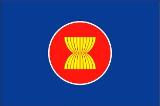With several Southeast Asian countries looking at nuclear power to meet their energy needs, the Association of Southeast Asian Nations (ASEAN) wants to ensure that nuclear material and technology is not used for non-peaceful purposes.
The ten members of ASEAN - Brunei, Cambodia, Indonesia, Laos, Malaysia, Myanmar, the Philippines, Singapore, Thailand and Vietnam - have all signed the regional non-proliferation treaty. However, Brunei, Indonesia, Malaysia, Thailand and Vietnam - have yet to ratify their support for the accord.
Since 1997, a treaty creating the SEANWFZ has been in force in the region, limiting the use of nuclear energy by members to peaceful purposes, such as power generation. Under the treaty, ASEAN members may not develop or test nuclear weapons and pledge not to allow the storage or transport of those weapons within their territories. However, naval ships from countries such as the USA often pass through busy Southeast Asian shipping lanes, without confirmation whether the ships are carrying nuclear weapons.
Ahead of the Asian security summit this week, ASEAN said that the five nuclear powers that are permanent members of the UN Security Council (China, France, Russia, the UK and the USA) should sign a protocol to the treaty.
Alberto Romulo, Philippine foreign secretary, said that the bloc would seek the expertise of the International Atomic Energy Agency (IAEA) as it considers any new restrictions. He said that the IAEA could also help ASEAN regulate the use of nuclear power in the region. "There are countries in Asia that are resorting to nuclear power for energy, for peaceful purposes and that's okay, but we want to ensure that it remains so," Romulo said. He added, "We want to ensure that whatever nuclear powers ASEAN countries have, the countries do not allow the export of certain materials which could lead to development of nuclear energy other than for peaceful purposes."
Malaysia will build a facility to monitor nuclear technology developments in Southeast Asia, according to a 14 July report by the country's national news agency, Bernama. Deputy prime minister Najib Tun Razak said that the 100 million Ringgit ($29 million) facility in Pahang state would be the first of its kind in Southeast Asia. Science, technology and innovations minister Jamaluddin Jarjis said the facility is expected to be completed in three years in collaboration with the International Atomic Energy Agency. "Its main function is to ensure that nuclear energy use in the region is only for peaceful purposes and not for making weapons," said Jamaluddin.
ASEAN leaders signed the Cebu Declaration on Energy Security at the 12th ASEAN summit on 15 January 2007. This encouraged the use of biofuels, hydropower and nuclear power in order to reduce oil dependency and greenhouse gas emissions. The document encourages the use of technologies that can reduce carbon emissions compared to the existing generation mix.
Indonesia, Thailand and Vietnam are all considering the construction of nuclear power plants in order to meet their rapidly increasing electricity demand.
In Indonesia, plans are to call tenders in 2008 for two 1000 MWe units, Muria 1 and 2, leading to decision in 2010 with construction starting soon after and commercial operation from 2016 and 2017. Muria units 3 and 4 will be built later, for operation from 2023. The government has said that it has $8 billion earmarked for four nuclear plants of total 6 GWe to be in operation by 2025.
Thailand's National Energy Policy Council commissioned a feasibility study for a nuclear power plant in the country, and among the options in the draft power development plan for 2007-2021 was the construction of 5000 MWe of nuclear generating capacity, starting up in 2020-21. In June 2007, the Energy Minister announced that the Electricity Generating Authority of Thailand (EGAT) will proceed with plans to build a 4000 MWe nuclear power plant. Construction will commence in 2015, to operate from 2020.
In February 2006, the Vietnamese government announced that a 2000 MWe nuclear power plant would be on line by 2020. A feasibility study for this is due to be completed in 2008. Formal approval would then be required to open a bidding process with a view to construction starting in 2011 and commissioning in 2017. In March 2006, it was reported that South Korea had expressed interest in bidding for the project, and its Ministry of Science and Technology would draft a plan for long-term cooperation on nuclear energy. This was signed in November 2006.
Further information
Association of Southeast Asian Nations
WNA's Emerging Nuclear Energy Countries information paper
WNN: Southeast Asian plans for nuclear
WNN: ASEAN summit declares support for nuclear
ASEAN tightens nuclear non-proliferation treaty
With several Southeast Asian countries looking at nuclear power to meet their energy needs, the Association of Southeast Asian Nations (ASEAN) wants to ensure that nuclear material and technology is not used for non-peaceful purposes.




_47120.jpg)

_23621.jpg)






